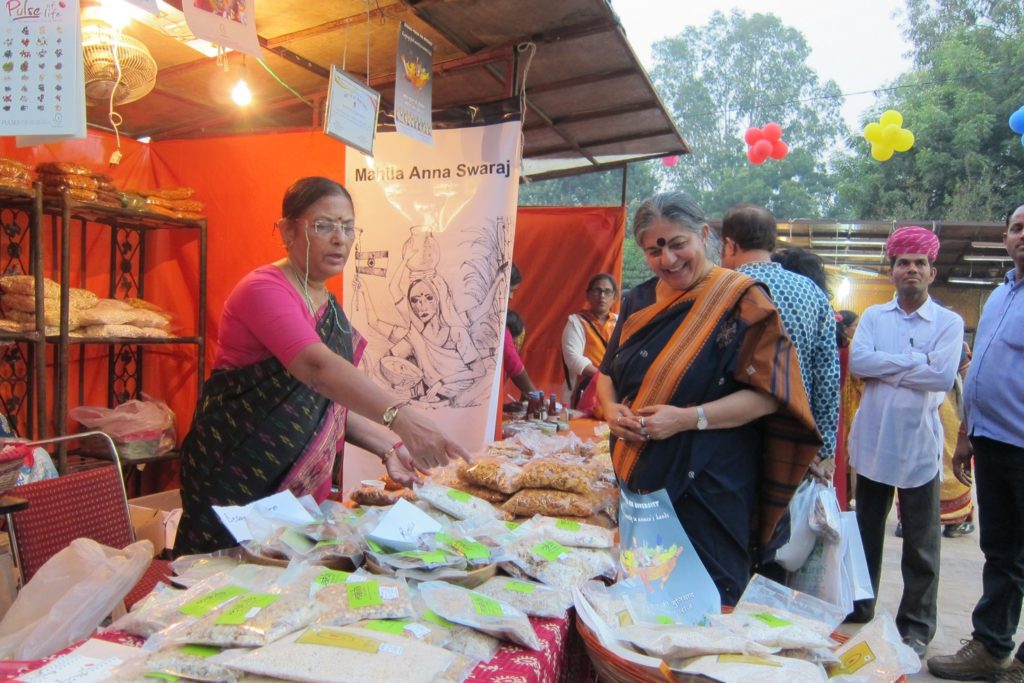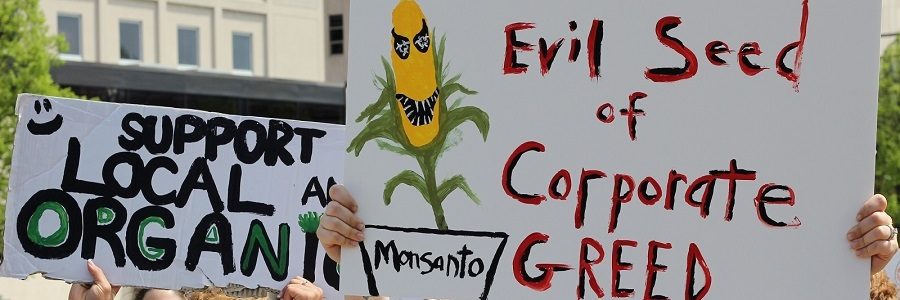
Transitioning from Corporate Globalization to Economic Democracy
–
A Manifesto
Corporate globalisation is a war against the planet and people
Market forces, resource intensive and profit intensive systems are creating havoc in our world, disrupting the planet’s ecosystems and society’s systems of democracy, justice and equality. Climate change, is wiping out entire communities and earth’s life-sustaining biodiversity, threatening the freedom of diverse species and diverse cultures to evolve. Species have disappeared at 1000 times the natural rate as monocultures and toxic chemicals are globalized through industrial agriculture. Water is disappearing, and soils are being desertified, driving communities and people off their land. Non communicable chronic diseases are emerging in epidemic proportions as our body is denied its essential biodiversity-based nutrition , and our vital gut micro-biome is assaulted by toxics. The freedom of diverse species and diverse cultures to evolve is being threatened by greed and the extractive society and the totalitarian tendencies that hold it in place.
This path is leading us to eventual self-destruction.
Economy as a subset of ecology and society.
Economy is derived from Oikos which means home. Ecology is the science of the household, economy the management. Trade is the subset of economy, the economy is a subset of ecology and society.
Corporate globalisation has put corporate profits above people and the planet, and reduced Earth’s home economy to the corporate economy. Greed, corporate globalisation and free trade are producing a sick planet, dying democracies and dying economies.
Governments, corporations and financial institutions are hiding this sick economy behind false measures. Chemicals, derived from war, are being spread around the world through industrial farming, destroying the planet and contaminating our bodies. ‘Growth’ is used as a measure of the health of the economy – an anonymous figure which tells us nothing in real terms of wellbeing and is used to justify the destruction of species and people’s lives. It is a calculation of a fiction which is based on commodification and commercialization of everything that is life. GDP is based on the assumption that if you produce what you consume, you don’t produce. Thus the real circular economies that sustain nature and society are reduced to zero. GDP is based on extracting resources from nature and wealth from society. This extraction creates the illusion that corporations, by extracting from nature and society and trading in goods and services which others have produced, are the ‘creators’ of what society needs and without them our needs will not be met.
The polarisation of society between the 1% and 99% is a symptom of the economic war against society. The 1% now controls 82% of the economy, robbing the rest of humanity of their rights and their share to the planet’s resources, societies’ wealth, livelihoods and basic needs. This system of theft from the 99% is built into the rules of corporate globalisation written by the controlling corporations for their unfettered profits and undermine all democratic systems that ensure justice and equality.
Free trade and corporate globalisation are based on privatising public goods, enclosing our commons, dismantling welfare systems and dismantling regulatory processes created for the protection of nature, workers, and vulnerable groups. They are based on the subversion of democracy. ‘Free market democracy’ is an oxymoron which really means complete freedom for corporations and no democratic rights for people.
When globalisation was imposed on the world in the name of free trade, leaders created the illusion that it would close the gap between rich and poor and create equality. They proclaimed free trade was like “a rising tide which lifts all boats”. Instead, corporate globalisation has created a steady tsunami that has wiped away small businesses, small farmers, small communities, local economies and local and national democracies everywhere.
This greed based polarised economy and free trade system has also divided society along lines of religion, race, gender, a convenient tool that is distracting the public from the absence of common good and institutionalising a divide and rule policy based on violence. Women and the most vulnerable bear the brunt of this violence through displacement because of war, climate change and competing interests in land and resources control. This covers the spectrum of climate refugees, war refugees, economic refugees, farmers, unemployed youth, small artisans, all of which the billionaire 1% class is now labelling the 99% of ‘useless’ people. These globalisers are also ‘pink washing’ and justifying their greed by claiming that free trade empowers women and promotes feminism, the latest illusion to come out of the WTO conference in Buenos Aires in December 2017.
The 1% does not represent society, economy or democracy. They only represent their limitless urge for profit, accumulation, extraction, and dominate and control. The levels of wealth accumulated through illegitimate means and writing the rules of trade and economy in violation of all democratic imperatives is now a cancer in society threatening the very systems it feeds on. Only the cancer cell does not know when to stop growing. All living systems from the tiniest microbe and cell to the largest mammal and the planet as a whole are self organised systems and are regulated to maintain their health and wellbeing. Regulation is vital to democratic and living systems.
Economic democracy is now a social, political, ecological imperative. Sowing the seeds of the future demands that we participate in democratically shaping our economies and our systems of production and consumption, replacing competition with cooperation.
With this manual we invite you to participate in the decisions that shape our lives and take back our power to stop the present destruction.
Principles for economic democracy include,
- The right and duty to protect people and the planet, our ecosystems, society and democracy. Globalisation and free trade have robbed us of our right and duty to protect under the label of “protectionism” allowing corporations to label our rights and duties to protect as an offense against their right to greed and profit. Corporations have invented the word “protectionism” as a corporate ploy to subvert economic democracy.
- The promotion, protection and practice of diversity : biological, cultural, economic, political, and knowledge for flourishing local and creative economies. Mechanistic, reductionist and linear systems of thought and action, undermine life’s intelligence, creativity, caring and knowledge.
- Defending, reclaiming and rejuvenating the commons as the common good and reversing all enclosures imposed by corporations. These include nature’s commons such as biodiversity, water, atmosphere, soils, our food, our health. The commercialization of the commons for corporate profits and market trading is a symptom of a competitive system of unfettered corporate greed.
- Reclaiming, recovery, and rejuvenating local economies based on subsidiarity, through localisation and decentralisation to reduce the ecological foot print, increase economic opportunities and wellbeing of people and communities, and enhancing community cohesion – a reversal of the present undemocratic imposition of globalisation, centralisation and concentration.
- Reclaiming national economic sovereignty based on democracy from the ground up through coherent local economic sovereignties, to promote the common good – vital for the prevention of the violence and destruction that is being fuelled through the rise of cultural nationalism based on the policy of divide and rule, and corporations’ free hand to control the national space, including suing government, leading to the subversion of democratic rule.
- A sustainable planet is based on ecological circular economies, supplying the needs of all within the parameters of the planet’s health. Non sustainability is based on linear extraction and competition, increasing pollution and waste. ‘Greenwashing’ terminology creates illusions, not sustainability.
- Social justice and economic equality are based on circular economies where the opportunities to create wealth and share wealth are circulated in society. The objective of all economic activity is to enhance the wellbeing of the planet and people. The flooding of “cheap” products and services is based on exploitation, extraction and externalisation of the true cost of the planet and people.
- All living systems, including people’s living economies and economic democracy are based on cooperation, sharing, sufficiency, mutuality, solidarity. Corporate control and greed is based on competition and commercialization of the commons, making communities compete for shrinking ecological, economic and political space, spreading insecurity and conflicts.
- Everyone has a right to dignified and creative work and society has an obligation to protect and reward all work equitably with justice and fairness. The deliberate destruction of work and rights of workers is at the heart of corporate globalisation. Corporations are imagining a world without work and defining the 99% as useless people. This future is no future in democracy.
- People’s real work and real knowledge are central to rejuvenating the earth and society.
Resistance Actions
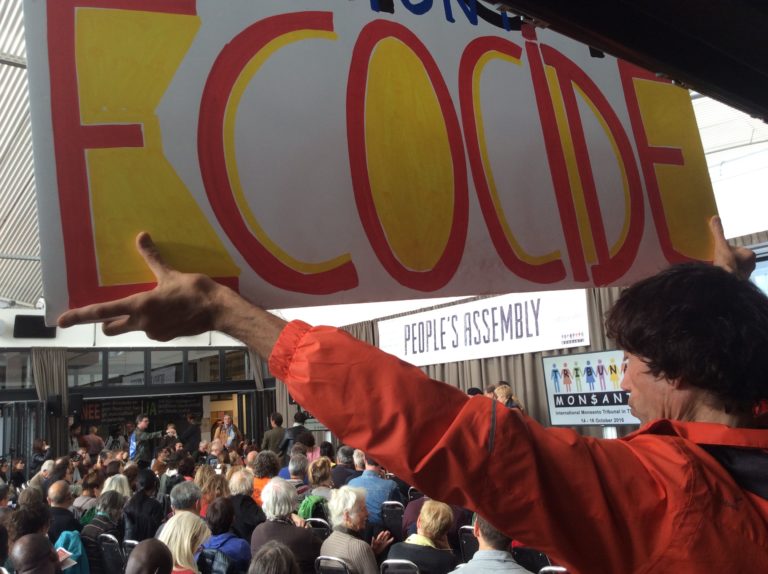
Citizens’ movements from across the world have taken a stand against this increasingly wide corporate control and monopoly. One of the major global events organised by Navdanya International, along with multiple civil society organizations, was the People’s Assembly at the Monsanto Tribunal in The Hague in October 2016, which brought together diverse movements from around the world.
The process of holding the Poison Cartel accountable for its crimes is the culmination of 30 years of scientific, legal, social, and political work by movements, concerned citizens and scientists. With the movement laying the ground for the tribunal, a parallel People’s Assembly was created to allow for movements from across the world to gather together, sharing problems, political strategies and visions of the future for a sustainable agriculture, which led to the consolidation of a global alliance of organisations, groups and citizens’ movements. The Monsanto Tribunal was a powerful tool in finally bringing the issue of ecocide to the centre of international discourse. It also focused on the widening gap between international human rights law and corporate accountability noting that the legal provisions in place which protect investors’ rights tend to undermine the capacity of nations to maintain policies, laws and practices protecting human and environmental rights. The Judges underscore the need to assert the primacy of international human and environmental rights law in the international legal framework and concluded that urgent action needs to be taken by the UN to avoid that key questions be resolved by private tribunals operating entirely outside the international framework. Furthermore, the Tribunal reiterates that multinational enterprises should be held accountable for their actions and be subjected to the International Criminal Court jurisdiction in cases of infringement of fundamental rights.

This global mobilization continued throughout 2017, and Navdanya International organised and co-organised multiple actions with movements across the world converging in a new unity across diversity to end a century of ecocide and genocide.
In 2018 a series of actions were co-organised in Germany. It kicked off in Düsseldorf with the “March Against Monsanto, Bayer & BASF” on May 19 and was followed, in Bonn, on May 24, by a press conference and a panel debate, organised by IFOAM – Organics International in cooperation with the Coalition Against BAYER-Dangers and Navdanya International which included the participation of Dr. Vandana Shiva and Harald Ebner (Bündnis 90 / The Greens), member of the Bundestag – among others. Farmers movements, environmental groups, trade unions and students organizations converged on May 25 at a protest in front of the WCCB building in Bonn, where the annual Bayer’s shareholders’ meeting was held. CSO’s representatives were also able to speak at the meeting inside the building.

In November 2018, a panel debate took place in Berlin: Visions for Agriculture 2050, with Vandana Shiva, president of Navdanya International and Norbert Lemken, head of the agriculture politics department of Bayer AG. The heated discussion centered mainly on the opposing views of the speakers. Norbert Lemken defined the discussion as “challenging”. Dr Vandana Shiva stated: “Biodiversity is the web of life, weeds are food and pests are insects, if left in the right balance. The Poison Cartel which began with the extermination of humans in Hitler’s concentration camps, has today brought entire species to extinction. But there is much that we can do as individuals and communities. The defense of life in its vitality and diversity begins with saving one seed, planting one garden”.
In addition, Navdanya International actively joined the widespread opposition against Free Trade Agreements and worked with the Italian coalition led by Stop TTIP Italia, to put pressure on the Italian government not to ratify CETA (Comprehensive Economic and Trade Agreement between Europe and Canada).
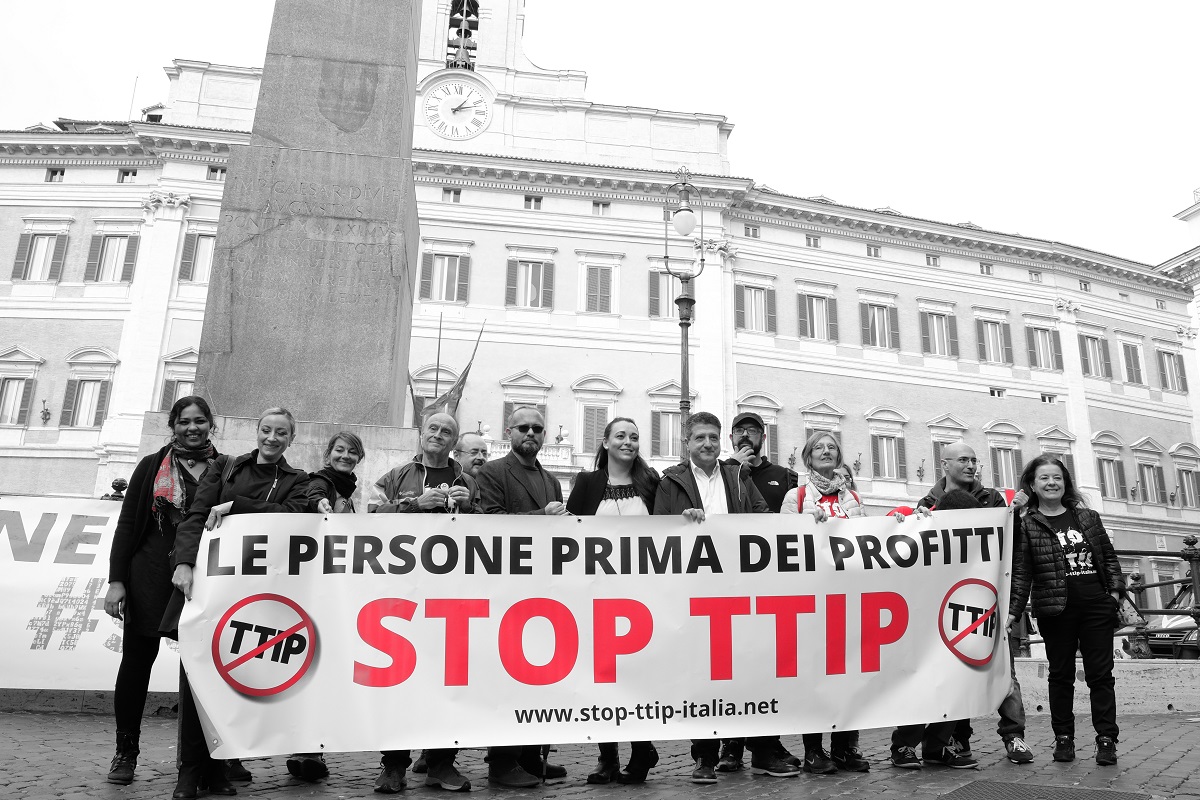
In October 2020, Navdanya International launched its collaborative Citizens Report on the Bill and Melinda Gates Foundation – “Gates to a Global Empire” . The Report gathers evidence and throws light on the dangers of philanthrocapitalism, which is boosting the corporate takeover of our seed, agriculture, food, knowledge and global health systems, manipulating information and eroding our democracies. A panel of contributing authors presented the report through an online conference. Throughout the authors’ presentations, we see how the same patterns of an aggressively imposed consensus through direct influence over all global development actors, repeat over and over again, and how technocratic solutionism, powered by an “unholy alliance” between the science and technology institutions, states, and big capital, are embodied by the Gates’ Foundation and dangerously put into accelerated action through a philanthropic development.
Activities towards Economic Democracy
In the course of 30 years, the work flowing from Navdanya Biodiversity Conservation Farm and Earth University has helped more than 200,000 hectare land to switch to organic and established the largest direct marketing, fair trade organic network in the country.
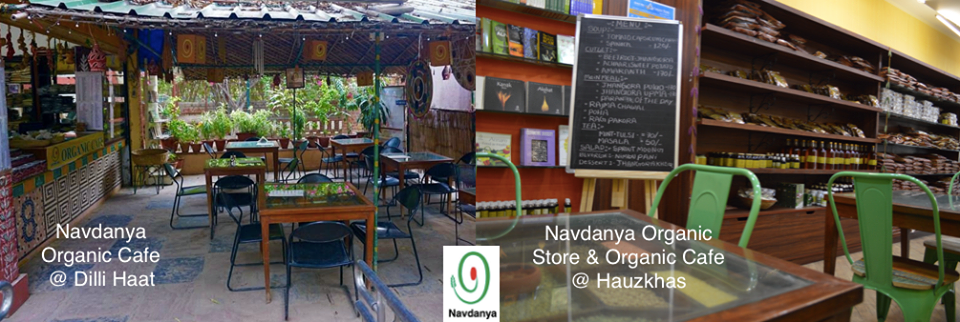
Navdanya Organic Slow Food Restaurant and Cafe in Dilli Haat, Delhi, serves traditional Indian dishes sourced from Navdanya’s network of organic farmers.

In Italy Navdanya International is working with Regional Movements for creating Local Food Systems and social and inclusive economy networks based on economic democracy. In collaboration with a vibrant and very active network which is progressively consolidating in the area of Rome and Lazio Region, Navdanya International co-organized, in March 2018, a local campaign in support and defence of farmers’ markets, which resulted in fruitful connections with policy makers and representatives of ecological movements.
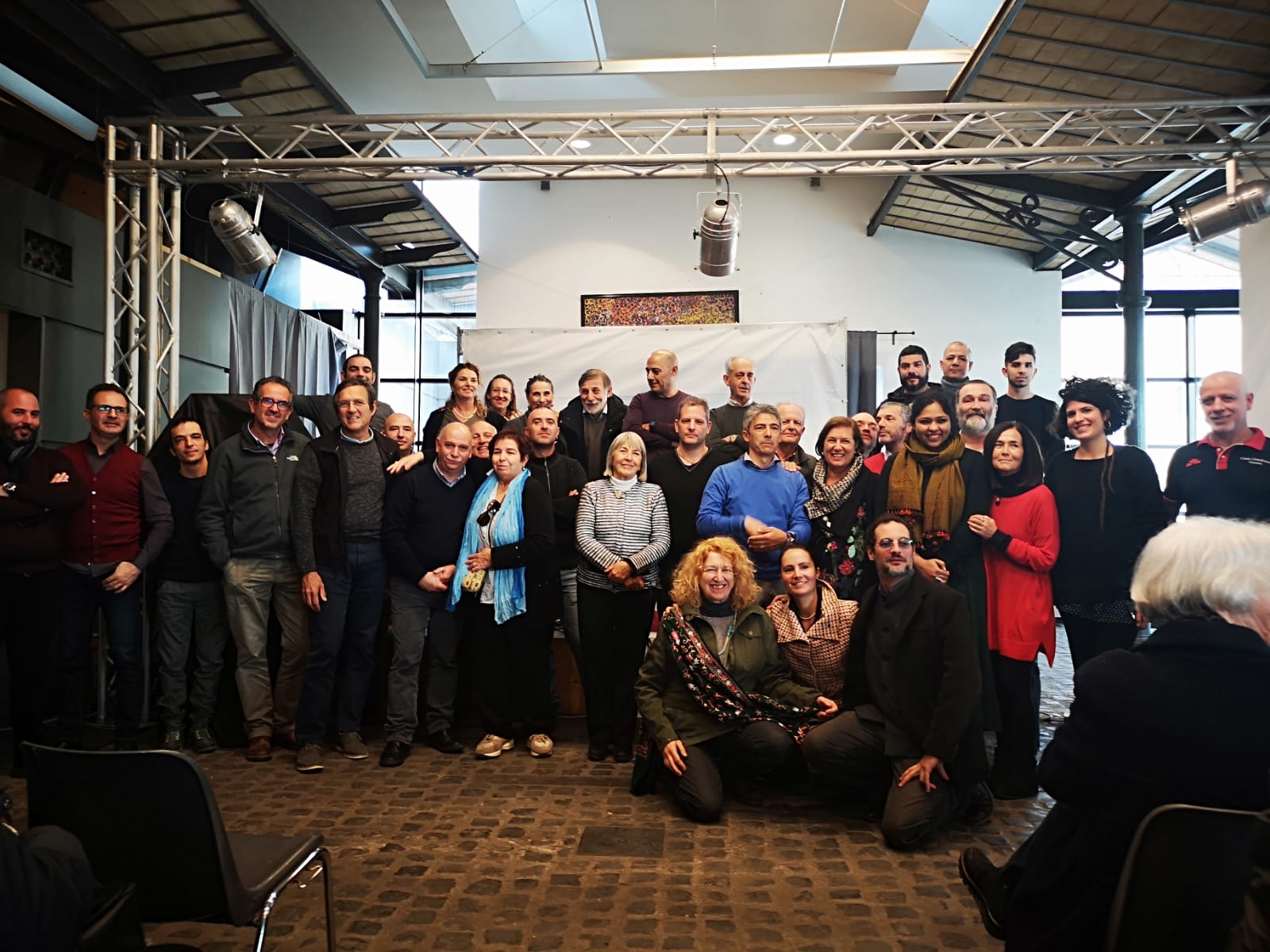
In November 2018, the Cultural Association of Sardinians in Rome (ACRASE, Maria Lai) and Navdanya International organized an event dedicated to the themes: Food and Health (in Sardinian: Mandigu pro sa salude) and protection of Biodiversity. The event hosted debates and a Farmers’ Market where associations, committees and producers from Sardinia and Lazio offered their healthy, local and biodiverse products.
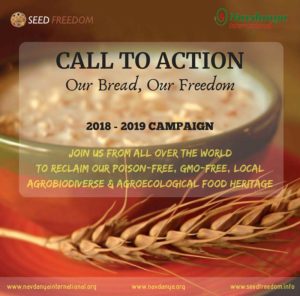
Our International and campaign and Call to Action: Our Bread, Our Freedom links the principles of our Food for Health campaign with biodiversity, agroecology and indigenous food systems. The focus of this campaign is the protection and promotion of traditional diets. We call our traditional diets and dishes our “Breads of Freedom”, which are at the heart of local food systems as the expression of a value chain that works for nature and for the health and dignity of people. They come from the varieties of our indigenous grains and staples, from biodiverse poison-free agriculture, from artisanal processing.

